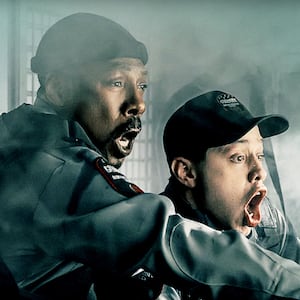It’s tough to sneak up on audiences twice.
Yet even though Zach Cregger established himself as a promising horror director with Barbarian, he manages to up the ante and deliver a unique, multifaceted, and unnerving work of terror—and, in the process, prove himself a genre filmmaker of tremendous talent—with Weapons.
Expanding upon many of the ideas and devices he employed in his breakout hit, Cregger’s latest upends suburban domestic calm by stealthily plumbing fears about family, home, and the social norms and bonds that tether our clans and communities together. Escalating at a mad rate until it tips into outright lunacy, it’s a higher and more hellish brand of nightmare.
Weapons, hitting theaters Aug. 8, commences with narration from third-grader Alex (Cary Christopher), who explains that the following story, set two years ago, is “true,” and that its particulars were never made public because the entire affair was covered up by those who failed to stop it. This voiceover sets a Grimm’s Fairy Tale mood—emphasis on the grim, since the yarn Alex begins spinning involves a most strange and disquieting incident.

On a nondescript weekday, none of Alex’s 17 classmates at Maybrook Elementary came to school. As everyone soon learned, the reason for their absences was that at 2:17 am that morning, these boys and girls woke up, walked downstairs, and ran out the front door, their arms slightly raised at their sides (as if they were pretending to be planes). The purpose of their night flight was unknown, as was their destination. The children, bafflingly, were just gone.
This causes unsurprising chaos in the picturesque enclave, and Weapons proceeds to divide itself between various perspectives, beginning with a segment from the vantage point of teacher Justine Gandy (Julia Garner), who’s stunned by her students’ disappearance, and promptly becomes the focal point of the community’s suspicion and ire.

At a town hall, parents—led by Archer Graff (Josh Brolin), father of missing Matthew—angrily proclaim that something must have happened under her watch to bring about this catastrophe. Later, her car is painted with an accusatory message: “Witch.”
Put on temporary leave, Justine turns to booze and her police officer ex-boyfriend Paul Morgan (Alden Ehrenreich). She coaxes him into falling off the wagon and cheating on his girlfriend Donna (June Diane Raphael), whose Chief of Police father Ed (Toby Huss) is Paul’s boss. Lost, upset, and alone, Justine spirals downward, and her situation doesn’t improve when she tries to talk to Alex—a no-no, according to Principal Andrew Marcus (Benedict Wong)—and discovers that things are amiss at his house.
Before that, or the ensuing insanity, can come into clear focus, Weapons leaps backwards to retrace these events via Archer, whose frustration, fury, and grief transform him, like Justine, into an amateur sleuth. Archer’s mapping of the kids’ routes leads to a possibly valuable clue. Cregger, however, draws out his material patiently, all while continuing to alternate between points of view, including those of Andrew, Paul, a drug addict named James (Austin Abrams), and ultimately Alex, whose relationship with his relatives has taken a turn for the strange, and whose role in this saga intensifies as it creeps toward its revelatory chapters.

Cregger favors shots that trail behind his characters, which both enhance intimacy with their POVs—at numerous points, his camera echoes their back-and-forth head turns—and stymie engagement, keeping them at a faceless remove. The tension between closeness and distance is central to Weapons, and the director further amplifies anxiety via expertly unsettling compositions; even a few low-angled shots of people snooping around in the dark and trying to open locked doors are fraught with menace.
Aesthetically, the film is taut and scary, boasting a couple of excellent jump scares and, better still, menacing images (highlighted by ones of a red-haired figure in the woods and a specter in a basement) that are apt to linger in the mind long after the specifics of the plot have faded from memory.
Though an ensemble piece, Weapons is led by an assured Garner, whose Justine appears initially mousy and then somewhat wilder, and a charged Brolin, whose bereft father operates on the line between sympathetic and belligerent.

Anger and desperation are born from loss and, more poignantly, the unknown, and Cregger fashions his film as another treatise on the unreliable (if not false) comforts and security of home and the neighborhoods that house them. On the heels of Barbarian—with which it shares a predilection for follicularly challenged fiends—it solidifies the director’s conception of residential dwellings as places of unspeakable terror, and families as the frequent perpetrators of evil.
Weapons is a mystery whose puzzle pieces are assembled at a slow, sinister rate, and even when its bombshells drop, they’re only partial answers that beget larger, more perplexing questions. Cregger strikes a balance between clueing viewers in and keeping them in the dark, the better to suggest the inexplicable cruelty and madness of the world.

His tableaus, be they in dream sequences which provocatively convey the dreamers’ consuming trauma and guilt, or a finale that rampages through the quiet hamlet, are likewise perched between lucid calm and unfathomable bedlam. In a classroom, at a gas station, or on the road, order is apt, at a moment’s notice, to devolve into turmoil. That volatility extends from the action at hand to the interior lives of the protagonists, whose normalcy is torn asunder by forces that are out of their control and capable of making them, ahem, snap.
As with his prior thriller, Cregger paints a portrait of nefarious schemers manipulating and weaponizing the young and innocent for malevolent purposes, albeit on a larger canvas that affords him the opportunity to damn (and sympathize) in multiple directions.
There’s nothing funny about either the pain and suffering of Justine, Archer, and the rest of those affected by these confounding circumstances, or the gruesome bloodshed they must face. Nonetheless, in his sterling climax, Cregger locates the maniacal humor in his horror, such that it’s difficult not to laugh at the unthinkable, incongruous anarchy of his snapshots of suburbia shattered, literally and figuratively, from within.
Beautiful in form and ghastly in content, it’s a startlingly original and unforgettable vision of individual and social disarray and destruction.









